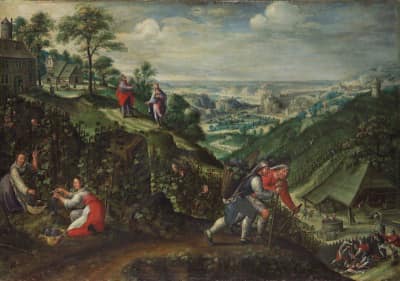 Gospel of 5 March 2021
Gospel of 5 March 2021
Friday of the Second Week of Lent
Matthew 21:33-43,45-46
This is the landlord's heir: come, let us kill him
Jesus said to the chief priests and the elders of the people, ‘Listen to another parable. There was a man, a landowner, who planted a vineyard; he fenced it round, dug a winepress in it and built a tower; then he leased it to tenants and went abroad. When vintage time drew near he sent his servants to the tenants to collect his produce. But the tenants seized his servants, thrashed one, killed another and stoned a third. Next he sent some more servants, this time a larger number, and they dealt with them in the same way. Finally he sent his son to them. “They will respect my son” he said. But when the tenants saw the son, they said to each other, “This is the heir. Come on, let us kill him and take over his inheritance.” So they seized him and threw him out of the vineyard and killed him. Now when the owner of the vineyard comes, what will he do to those tenants?’ They answered, ‘He will bring those wretches to a wretched end and lease the vineyard to other tenants who will deliver the produce to him when the season arrives.’ Jesus said to them, ‘Have you never read in the scriptures: It was the stone rejected by the builders that became the keystone. This was the Lord’s doing and it is wonderful to see?
‘I tell you, then, that the kingdom of God will be taken from you and given to a people who will produce its fruit.’
When they heard his parables, the chief priests and the scribes realised he was speaking about them, but though they would have liked to arrest him they were afraid of the crowds, who looked on him as a prophet.
Reflexion
According to a recent survey, when parents were asked what they worried about most regarding their children, the majority didn’t name drugs, sex, global warming, political crisis, or the economic future. Instead, two-thirds of parents said their primary concern about their kids, was their sense of entitlement. They’re right to worry. A sense of entitlement breeds a number of negative qualities: envy, resentment, selfishness, greed, petulant indignation, laziness, detachment, and a lack of resilience. A sense of entitlement is the opposite of a sense of gratitude.
This is what we see in today’s parable of the wicked tenants. Instead of showing gratitude for having received stewardship of a vineyard which they had no claim to, nor had played any part in its cultivation and development, they had allowed their sense of entitlement fester to the point of producing envy, greed, theft and finally murder.
The preceding verses provide us with the context which allows us to understand the meaning of this parable. The actions and teachings of our Lord had provoked the ire of the religious leadership who saw Him as a threat to their authority. And so this entitled lot questioned our Lord as to the source of His authority. And in the ensuing parable of the wicked tenants, our Lord does give them an answer. In the son of the landowner, our Lord suggests that He is the Son, the owner of the Temple is none other than God. And it doesn’t take a genius to know that our Lord was using the example of the wicked tenants to refer to them. And they get it. They would not have been triggered by the story if they had failed to understand its meaning. But despite understanding the significance of the story, they reject its message as they had rejected our Lord’s authority and claims.
The meaning of the parable should not be lost on those of us today who are stewards of God’s grace–individually or collectively. When we get so focused on our own good works and neglect the One we are working for, we can develop a false sense of entitlement like the wicked tenants who claimed ownership of the vineyard and all they produced from it.
The Grace of God is not an entitlement! Just because I serve in the Church or proclaim the gospel of Jesus Christ doesn’t make it mine! It doesn’t make me its proprietor nor does it mean God owes me.
So, we aren’t entitled to the fruits of God’s Kingdom; we are merely recipients of His unmerited favour. And, when we have received it into our lives, then we respond to God’s graciousness with gratefulness instead of entitlement.
Entitlement is essentially ingratitude, and gratitude is thus its antidote. Where entitlement says, “I’m owed that,” gratitude says, “The world doesn’t owe me anything, God doesn’t owe me anything.” Where entitlement says, “I deserve this,” gratitude says, “Everything I get is a gift.” Whereas entitlement is the origin of many vices, gratitude, as Cicero said, is the greatest of virtues, because it is the fount of all the rest.
We are just tenant-farmers who work the vineyard and the fruits of our labour all belong to God. It is always God’s vineyard no matter how hard we work in it or how successful we are in harvesting it. For it is He who plants it, cultivates it, tends it, and finally when it is time for the harvest, in His graciousness He allows us to reap the rewards of our stewardship and fidelity.
